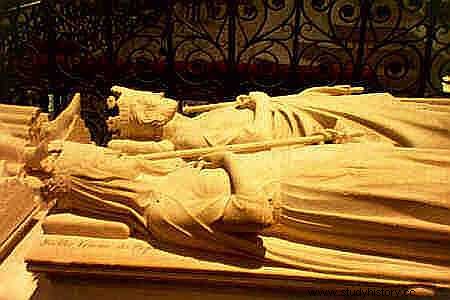Intro
Several years after the conquest of Gaul by Clovis and his descendants, the Frankish kingdom was plagued by fratricidal wars. The wealth of the Merovingians ceased to grow because of the greed of the officials in charge of levying taxes as well as the absence of military victories which deprived the kingdom of its booty and tribute. Thus the last Merovingians were forced to squander their fortune to buy the loyalty of their men. Deprived of its wealth, the royal power weakened considerably in favor of a rich aristocratic family from the Meuse:The Pippinids, ancestor of the Carolingians.
The lazy kings
Good King Dagobert
On the death of his father, Clotaire II, in 629, Dagobert I became King of the Franks, but he had to cede Aquitaine to his brother Caribert II. After the assassination of his brother, Dagobert once again reconstitutes the unity of the Frankish kingdoms and chooses Paris as its capital. He then surrounded himself with skillful advisers, aristocrats such as Saint Eloi or Saint Ouen. He submits the Gascons and imposes his suzerainty on Brittany. Dagobert relies fully on the clergy to govern like his ancestor Clovis, he knows perfectly well that religion is the only coherent force in the Kingdom. He is also a patron, protector of the arts, he decides for example to fill the basilica of Saint-Denis with donations. During the ten years of his reign, Dagobert will enjoy absolute power, he maintains good relations with Byzantium and tries to oppose the new Slavic power. However, very quickly, he was threatened by non-direct heirs of Chilpéric, who allied with the Gascons seized almost all of the kingdom of Aquitaine. On the death of this great sovereign, anarchy returns and the dynasty weakens definitively, no king will have such prestige in the whole kingdom.
Dagobert's song
The famous nursery rhyme concerning Dagobert actually dates from 1787, when it was meant to ridicule royalty. To avoid censorship, the authors were inspired by a very ancient king, they also added the character of Saint Eloi to make themselves more credible. Dagobert indeed had a dissolute life, and had several wives at the same time.
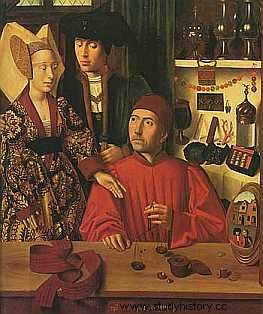
Saint-Eloi goldsmith, by Pertrus CHRISTUS
The Pippinids, a rich and powerful family
During the Merovingian period, the king is assisted by a Mayor of the Palace, originally a simple steward of the Palace, he will gain increasing influence to become a head of administration, appointing counts, dukes, bishops, also deciding war and peace. Mayor of the Palace of Austrasia, Pépin de Landen, a rich aristocrat, had contributed to the reunification of the kingdom under the aegis of the King of Neustria:Clotaire II, on the latter's death, he became one of Dagobert's advisers before being dismissed for his claims. He again became Mayor of the Palace of Austrasia in 639 because Dagobert's sons were too young to reign. Grimoald, the son of Pépin de Landen, has the same aspirations as his father, after having obtained the position of Mayor of the Palace of Austrasia, he manages to gain the confidence of King Sigebert III (son of Dagobert). Extremely audacious, Grimoald had his own son adopted by Sigebert and had the pretender to the throne (Dagobert II) locked up in a convent in Ireland. But this unmasked usurpation will ultimately lead to the assassination of Grimoald and his son. But ten years later, his nephew Pépin de Herstal manages to impose himself as Mayor of the Palace of Austrasia, indeed his military and political power makes him an essential man. In 687, after the Battle of Tertry, he seized the Town Hall of the Palace of Neustria. This family, known as the Pippinids (which would give rise to the Carolingians), is now the undisputed mistress of the entire northern kingdom (Neustria and Austrasia).
The lazy kings
Faced with the growing power of the Mayors of the Palace, the descendants of Dagobert are commonly called "lazy kings" because of their impotence to the throne (nothing). Indeed, most of them arrive on the throne at a young age and have a very short life expectancy, so little is known about some of them. On the death of Dagobert, the kingdom was divided between his two sons, Sigebert III (Austrasia) and Clovis II (Neustria). These two kingdoms were once again in the grip of an endless confrontation. After having suffered two failures, Pépin de Herstal crushes Neustria at Tertry, but while the power is in his hands, Pépin does not dare to seize the crown. He therefore leaves the king of Neustria (Thierry III) whom he has just beaten symbolically on the throne.
Distribution of the kingdom on the death of Dagobert

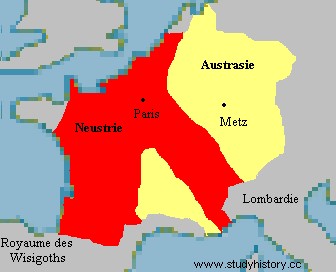
Charles Martel
The advent of Charles Martel
Shortly before his death, in order to avoid quarrels for his succession as Mayor of the Palace, Pépin de Herstal designates his illegitimate son Charles Martel as sole successor. But when Pépin dies, his wife Pléctrude imprisons the young Charles in order to have his two sons elected. Soon, Neustria rose up and in 715, on the death of Dagobert III, the Neustrians freed a young cleric from a monastery who claimed to be the son of Childeric II, whom they had crowned. The regency of Pléctrude therefore resulted in the destruction of the work of Pépin de Herstal. However, the young Charles Martel manages to escape from his prison, determined, he gathers supporters of Austrasia behind him. On the death of Pléctrude, he manages to seize the town hall of Austrasie. Ambitious, he signs a truce with the Frisians (Germanic people) and goes to war against the Neustrians and their allies in Aquitaine. In 717, at Vincy, he inflicted a crushing defeat on his enemies and was able to make his triumphal entry into Paris.
Charles Martel
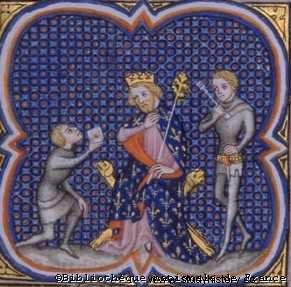
National Library of France
The reunification of the kingdom
Charles Martel is now sole mayor of the palace of the kingdoms of Austrasia, Neustria and Burgundy combined. He governs the kingdom in place of the Merovingian Thierry IV, a 10-year-old child. He then decides to restore the unity of the Franks. He then relied on the aristocratic families who owed him his fortune, he ensured the support of the Church by ousting the bishops who were hostile to him and by approaching the papacy of Rome. At the head of a powerful army, he crushes the Frisians and the Saxons and submits Thuringia and Bavaria. Charles Martel begins a policy of secularization of Church property, in order to have new lands for rich aristocrats, at the head of a powerful cavalry. Having bought their loyalty with land, Charles Martel thus contributed to the birth of the feudal regime.
The Islamic threat
Less than a century after Muhammad's death, Muslim warriors had invaded Spain. At the beginning of the 8th century, they crossed the Pyrenees and invested Languedoc, Christianity had never been so threatened. The Duke of Aquitaine, Eudes, had managed to curb the Islamic push near Toulouse in 721. The Duke Eudes had allied himself with a Berber governor of Septimania, who of Muslim religion was in revolt against his co-religionists. Only the governor of Spain, Abd al-Rahman, had channeled the revolt and was now embarking on a punitive expedition against the Aquitanians. Faced with such danger, Eudes appealed to his neighbor Charles Martel who controls all of the North of the Loire. This advances his army from all parts of the Frankish kingdom. The battle begins near Poitiers against the troops of Abd al Rahman. Charles Martel equips each of his soldiers with a sword, a hauberk and a long spear. After seven days during which the troops engaged in only a few skirmishes, the Arabs finally decided to attack, but they came up against the Frankish defenses unnecessarily. Abd al-Rahman is killed during the battle, and the Arabs flee during the night. Legend has it that 375,000 Arabs died. On the strength of this success, Charles Martel invested Aquitaine and drove out the Muslim leaders who had settled there. The Frankish leader then appears as the savior of Christianity, and the undisputed master of the Frankish kingdom.
The Battle of Poitiers
Charles takes his name from Martel "the one who strikes like a hammer" thanks to his incredible energy which allowed him to crush the Muslims.
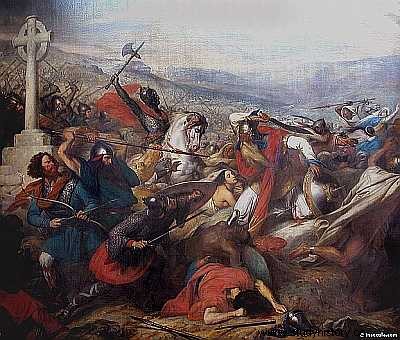
The Battle of Poitiers, by Charles STEUBEN
Pepin the Short
The battle for succession
Shortly before his death in 741, Charles Martel had divided the kingdom between his two sons:Carloman and Pépin. Only the will of Charles had made unsatisfied dissatisfied, in particular Hunald, the son of the duke Eudes of Aquitaine. This one could find the support of the duke of Bavaria and Griffon, one of the sons of Charles born of another union. Pépin and Carloman then join forces to fight against these revolts which torpedo the four corners of the kingdom. The two brothers begin by crushing the Aquitaine, then divide the duchy. Then Carloman submits the Alémans, in the East after a severe and cruel repression. Pépin meanwhile, a skilful diplomat, manages to spare Bavaria. Then remained Griffon, the jealous half-brother who was persuaded by his mother that he obtained vast territories from Charles. Griffon is captured and imprisoned in Neufchâteau, however he manages to escape thanks to the complicity of his sister. Refugee in Aquitaine, he revives the revolt alongside Duke Hunald. But the troops were defeated again in 745, Hunald then withdrew from Aquitaine. But Griffon manages to join the Saxons whom he pushes to revolt. Pépin then took up arms and defeated the rebellion, and, to calm the ardor of his young half-brother, Pépin named Griffon Duke of Le Mans, granting him 12 counties.
Pepin the Short, King of the Franks
Very pious, Carloman decides to become a monk, Pépin who is nicknamed "the Brief", because of his small size, is then alone to govern the State. The two brothers had not previously failed to elect Childeric III, who was king of the Franks only symbolically. Pepin the Short now aspired to gird the Frankish crown, he concluded an agreement for this purpose with the pope, Zacharias:in exchange for his help against the Lombards, who threatened the States controlled by the Church, this one authorized to deposit the last Merovingian king, Childeric III. Thus in November 751, in Soissons, Childeric was arrested, shaved (thus losing his royal character), and imprisoned. The assembly of the Grands of the kingdom then appoints Pepin, king of the Franks. The Archbishop of Mainz, Boniface, anoints the new king by marking his forehead with holy oil (Holy Chrism). This coronation ceremony, with its rite of anointing the king with holy oils, was perpetuated in France until the 19th century. It had a double meaning:through it, royal power acquired sacred power, and the Church was recognized as the source of power.
Coronation of Pepin the Short
Subsequently, in 754, Pope Stephen II granted, by a second coronation, to the royalty of Pepin the essential religious character. A new legitimacy was created and inaugurated by the family's alliance with the papacy.
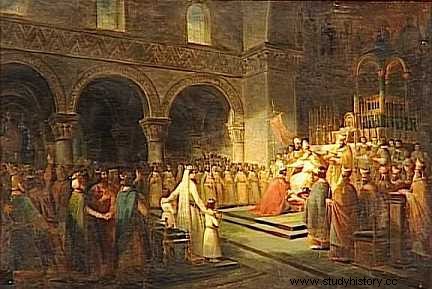
Coronation of Pepin the Short by Pope Etienne II in Saint-Denis on July 28, 754, by François DUBOIS 1837 (Châteaux de Versailles et de Trianon)
The Franks to the aid of the papacy
Having received with his sons the title of "Patrice of the Romans", Pepin now had to pay off his debt to the pope. The Lombards, a Germanic people, always represented a threat since the 6th century when they settled in the Po plain. They invaded the Byzantine possessions in Italy, occupied Ravenna and even dared to attack Rome. In 754, the Pope even made the trip to come and ask for help from the King of the Franks. Never had a pope undertaken such a journey. Pepin then launched two expeditions to Italy, which put a stop to Lombard expansion. The liberated territories were handed over directly to the Church and not to their rightful owner, the Emperor of Byzantium. This gift, which was called "the gift of Pepin", was the basis of the formation of the States of the Church. The Catholic Holy See then broke away from Byzantium and henceforth left its security to the Frankish sovereigns. This will lead in 1054 to the schism between the Orthodox Christians of the East and the Catholic Christians of the West.
A Great Reign
From 756, after having tried to subdue the Saxons and the Bavarians, Pepin prepared the final conquest of Aquitaine, still in revolt, but it was not until 768 that he achieved his ends. He also expelled the Arabs from Septimania. At the same time, the King of the Franks laid the foundations for a solid administration in his kingdom and initiated the “Carolingian renaissance”. Outside, several attempts at rapprochement were made with the Byzantines and the Arabs, preparing the imperial vision of his kingdom. Internally, his greatest task was to erase the Neustria-Austrasia divide which had divided Gaul since the 6th century. When Pépin fell ill in 768 and had himself taken to Saint-Denis to die there, he divided his kingdom between his two sons, Charles and Carloman. The work accomplished by this sovereign was immense, and under the impulse of his son Charles, the Pippinids were henceforth to be called the Carolingians.
Pépin le Bref and Berthe au Grand Pied
